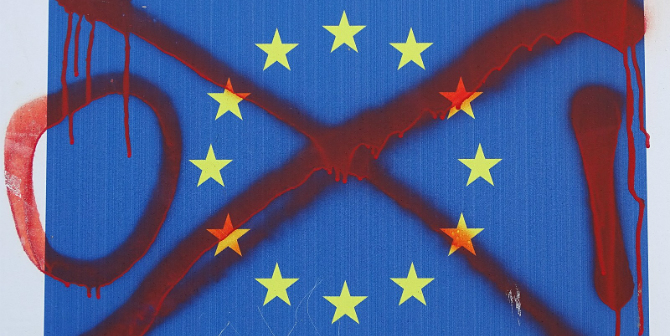 Our regular columnist Matthew Goodwin surveys the possible impact of the terrorism in France and storms around immigration and national borders for British public opinion on EU membership, and looks at other developments in recent research.
Our regular columnist Matthew Goodwin surveys the possible impact of the terrorism in France and storms around immigration and national borders for British public opinion on EU membership, and looks at other developments in recent research.
The Paris massacres are highly likely to affect the progress of the UK’s European referendum. However, one unknown is whether citizens perceive the more effective response to terrorism to be at the EU level or the national level. One poll this week indicated that the British public is divided on this. While 39% feel that EU membership makes Britain stronger, 26% think that it weakens Britain’s security, and 23% thinks it makes no difference. Clearly, much will depend on the Remain camp’s ability to make the case for pan-European cooperation, as well as the Leave’s camp success in convincing voters that it is riskier to stay in than get out.
Meanwhile in the latest Poll of Polls there has been little movement with
- Remain 52%
- Leave 48%
However, the fact that the race has tightened since the beginning of the summer has prompted some observers to highlight the distinct possibility of British exit. Yet Peter Kellner still believes that a Remain vote is the most likely outcome, although he notices several trends that are working to favour Leave:
- Many voters remain uncertain about the perceived effects of Brexit
- The percentage who see Brexit as a risk has fallen (though it is still a majority)
- Boris Johnson has yet to show his hand, and evidence suggests that he could tilt the balance.
We might add to this list the possible impact of external ‘shocks’ between now and the vote date, such as further terrorist atrocities, a continuation or acceleration of the refugee crisis, or another financial downturn. At one event last week a German civil servant made two interesting observations. One was that the number of refugees arriving in Europe is not falling to the levels expected as winter nears. The other is growing concern over rising numbers of migrants from Afghanistan and North Africa, who are joining those from elsewhere.
Votes at 16?
A potential new variable has been introduced by events in the Lords – the prospect of referendum votes for 16 and 17 year olds. What effect would this have? In the 2014 independence referendum in Scotland, Alan Renwick points out that turnout among this group lagged behind the overall average by around ten points, a trend that has also emerged in other referendums around the world.
However, in Scotland these young voters were still around twenty points more likely than 18-24 year olds to vote. And as Renwick points out, using an analysis of under-18s from the British Election Study, they lean strongly toward Remain. So, this could make a real difference.
Other evidence-based blogs this week:
- Simon Hix looks at whether UK civil servants are at the centre of EU negotiations
- Iain Begg on Cameron’s risky renegotiation strategy (Michael Keating is also not impressed)
- I look at Ukip’s response to the Paris events, and what it might mean for the referendum
- And this blog by Matt Singh is interesting on why pollsters got the general election wrong. Among other things the polls underestimated Ukip’s impact on Labour, which may have implications for the referendum campaign too.
This post is a re-edited version of Matthew’s bulletin, A round-up of research on Britain’s EU Referendum.
The article gives the views of the author, and not the position of the LSE BrexitVote blog, nor of the London School of Economics and Political Science.
About the author:
 Matthew Goodwin is Professor of Politics in the School of Politics and International Relations at the University of Kent, and Associate Fellow at Chatham House. He is also a senior fellow at the UK in a Changing Europe project. His most recent book is the co-authored Revolt on the Right: Explaining Support for the Radical Right in Britain (2014). Matthew tweets at @GoodwinMJ
Matthew Goodwin is Professor of Politics in the School of Politics and International Relations at the University of Kent, and Associate Fellow at Chatham House. He is also a senior fellow at the UK in a Changing Europe project. His most recent book is the co-authored Revolt on the Right: Explaining Support for the Radical Right in Britain (2014). Matthew tweets at @GoodwinMJ






